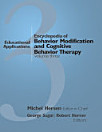Issues in Diagnostic Research
Michel Hersen · Cynthia G. Last
des. del 2012 · Springer Science & Business Media
Llibre electrònic
360
Pàgines
reportNo es verifiquen les puntuacions ni les ressenyes Més informació
Sobre aquest llibre
Prior and subsequentto the publication of the third edition of the Diagnos tic and Statistical Manual of Mental Disorders (DSM-III), we have witnessed a considerable upsurge in the quantity and quality of research concerned with the psychiatric diagnostic process. There are several factors that have contributed to this empirical influx, including improved diagnostic cri teria for many psychiatric disorders, increased nosological attention to childhood psychopathology, and development and standardization of several structured diagnostic interview schedules for both adult and child populations. With the advent of DSM-III-R, and in anticipation of DSM-IV, diagnostic labels and their definitions have been in a state of change, as evinced by the many refinements and modifications currently taking place. However, the basic purpose or raison d'etre of the nosological scheme has not been altered. Psychiatric diagnosis is the means by which we classify or categorize human psychopathology. And, as is the case in the medical arena, psychiatric diagnosis serves three central functions: classification. communication. and prediction. As research accumulates, our understanding of psychiatric disorders increases, and we are in a much better position to classify reliably and with validity, as well as to com municate and predict Despite periodic changes in the diagnostic system, the basic strategies for conducting diagnostic research (e. g. , genetic-family studies, biological markers, follow-up studies, etc. ) do not vary appreciably over time. But in over one decade no scholarly book has appeared that tackles the essential research issues involved in upgrading the diagnostic endeavor.
Puntua aquest llibre electrònic
Dona'ns la teva opinió.
Informació de lectura
Telèfons intel·ligents i tauletes
Instal·la l'aplicació Google Play Llibres per a Android i per a iPad i iPhone. Aquesta aplicació se sincronitza automàticament amb el compte i et permet llegir llibres en línia o sense connexió a qualsevol lloc.
Ordinadors portàtils i ordinadors de taula
Pots escoltar els audiollibres que has comprat a Google Play amb el navegador web de l'ordinador.
Lectors de llibres electrònics i altres dispositius
Per llegir en dispositius de tinta electrònica, com ara lectors de llibres electrònics Kobo, hauràs de baixar un fitxer i transferir-lo al dispositiu. Segueix les instruccions detallades del Centre d'ajuda per transferir els fitxers a lectors de llibres electrònics compatibles.





